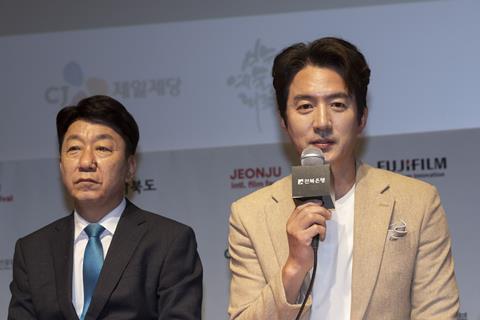
South Korea’s Jeonju International Film Festival (April 27-May 6) has unveiled a line-up of 247 films from 42 countries for its 24th edition and will open with Tori And Lokita by Jean-Pierre and Luc Dardennes.
The Belgian filmmaking duo will attend the Korean premiere of their feature, which played in Competition at Cannes last year and won the festival’s special 75th anniversary prize.
Jeonju will close with the world premiere of Kim Hee-Jung’s Where Would You Like To Go?, a Korea-Poland co-production about a woman who travels to Warsaw after the accidental death of her husband. Starring Park Haseon, it is based on a short story of the same name by novelist Kim Ae-ran.
The lineup was announced at back-to-back press conferences in Jeonju and Seoul today (March 30) by new co-directors Jung Joonho and Min Sungwook.
The 10-day event will include an awards ceremony on May 3 while the Jeonju Project industry programme will run April 30 to May 2.
This year’s selection includes 66 world premieres and seven international premieres.
All 10 titles in the international competition will receive their Asian premieres and comprise first or second features by rising directors. The selection includes titles from East Asia such as China’s Absence, directed by Lang Wu and starring Lee Kang-Sheng, and There Is A Stone by Japan’s Tatsunari Ota – both of which played at the Berlinale.
Also in competition is Turkey’s Almost Entirely a Slight Disaster by Umut Subasi; Denmark’s The Quiet Migration, directed by Malene Choi; Argentina’s About The Clouds by Maria Aparicio; and French documentary Orlando, My Political Biography by Paul B Preciado, which won three awards and a special mention in the Encounters section of the Berlinale last month. Ukrainian thriller Sashenka by Alexander Zhovna will also compete, following its premiere at Tallinn Black Nights.
Titles in the Korean Competition strand were announced earlier this week.
Alongside established strands such as Frontline and World Cinema is Focus: East Asian Films Now, which has been newly launched to introduce new filmmakers from Korea, China and Japan. A total of seven East Asian Films are set to be screenings including Stonewalling, directed by China’s Ji Huang and her Japanese husband Ryuji Otsuka; Alone Together by Japan’s Yukiko Mishima; and documentary Hidden Letters by China’s Violet Du Feng.
A special programme curated by actor, musician and artist Bek Hyunjin is also among the lineup, including two of his own shorts and three titles by influential Spanish filmmaker Luis Bunel.
In its 10th edition, Jeonju Cinema Project (JCP), the festival’s programme that selects projects to fund, produce and distribute, will see the screenings of eight completed films. The JCP Next Edition selection, pitching for up to KRW100m ($77,000), was previously announced.
Organisers said that a conference linked to the 10th anniversary special exhibition of JCP will review the role of the film festival as a film producer, examine the “crisis” of the Korean independent film industry after the pandemic, and seek ways to overcome it.
The festival also announced that unlike previous years, when most events were held in specialised spaces within Film Street in downtown Jeonju, the festival space will be expanded throughout the city. Official events and large-scale screenings such as the opening and closing ceremonies – previously held in the large Jeonju Dome – will now be divided between the Sori Arts Centre of Jeollabukdo and Jeonbuk National University Cultural Centre.
Jeonju IFF 2023: International Competition
About The Clouds (Arg)
Dir. Maria Aparicio
Absence (China)
Dir. Lang Wu
After (Fr)
Dir. Anthony Lapia
Almost Entirely A Slight Disaster (Turk)
Dir. Umut Subasi
H (Sp)
Dir. Carlos Pardo Ros
Night Detour (Can)
Dirs. Ariane Falardeau St-Amour, Paul Chotel
Orlando, My Political Biography (Fr)
Dir. Paul B Preciado
The Quiet Migration (Den)
Dir. Malene Choi
Sashenka (Ukr)
Dir. Alexander Zhovna
There Is A Stone (Japan)
Dir. Tatsunari Ota

























No comments yet